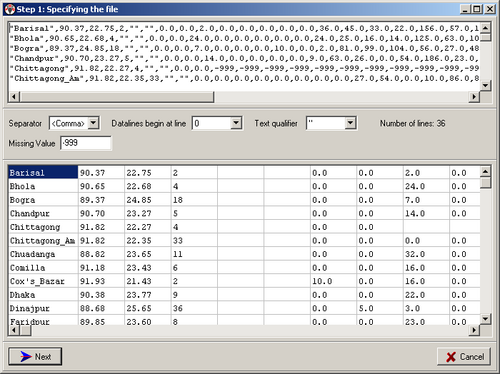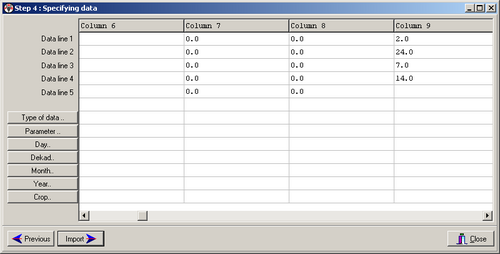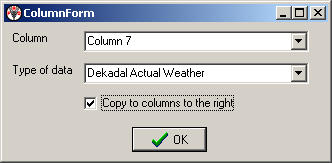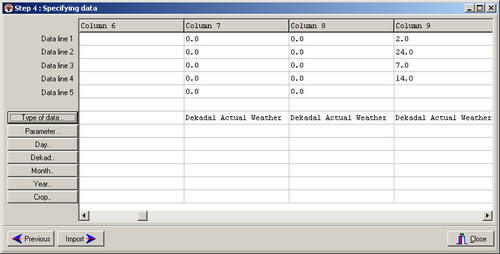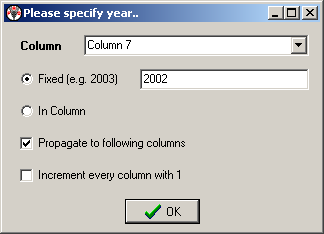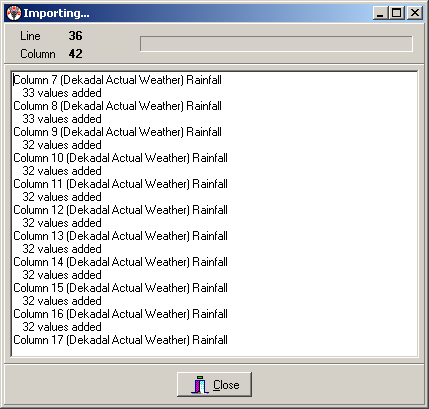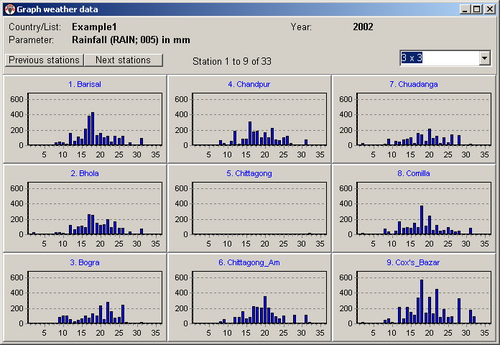(Difference between revisions)
| Revision as of 12:45, 4 August 2006 Peter (Talk | contribs) (→'''Example of importing ASCII data into the AgrometShell database''') ← Previous diff |
Current revision Peter (Talk | contribs) (→'''Example of importing ASCII data into the AgrometShell database''') |
||
| Line 1: | Line 1: | ||
| + | <blockquote> | ||
| + | |||
| ='''Example of importing ASCII data into the AgrometShell database'''= | ='''Example of importing ASCII data into the AgrometShell database'''= | ||
| + | The filename of the file that will be imported is ''Dekadal_Actual_Rainfall_2002_Bangladesh.dat''. This file contains dekadal rainfall for 2002 | ||
| - | <blockquote> | + | |
| - | {|"class=prettytable" cellpadding="15" | + | {|"class=prettytable" cellpadding="15" border="1" style="border-collapse:collapse" |
| - | |width="225"|text||[[Image:image019.jpg|500px|]] | + | |width="225"|The next screen pops up||[[Image:image019.png|500px|]] |
| - | |width="225"|text||[[Image:image021.jpg|500px|]] | + | |- |
| - | |width="225"|text||[[Image:image023.jpg|500px|]] | + | |width="225"|Please note that missing values are shown as blank cells. Press <next>||[[Image:image021.png|500px|]] |
| - | |width="225"|text||[[Image:image025.jpg|500px|]] | + | |- |
| - | |width="225"|text||[[Image:image027.jpg|500px|]] | + | |width="225"|Assume the data are imported into the ‘Example1’ stations list. Longitude, Latitude etc. are already specified, so those fields are not specified. ||[[Image:image023.png|image023.png]] |
| - | |width="225"|text||[[Image:image029.jpg|500px|]] | + | |- |
| - | |width="225"|text||[[Image:image031.jpg|500px|]] | + | |width="225"|The stations are found in the database. Pressing <Next> brings up the next screen||[[Image:image025.png|image025.png]] |
| - | |width="225"|text||[[Image:image033.jpg|500px|]] | + | |- |
| - | |width="225"|text||[[Image:image035.jpg|500px|]] | + | |width="225"|The data definition screen appears.||[[Image:image027.png|500px|]] |
| - | |width="225"|text||[[Image:image037.jpg|500px|]] | + | |- |
| - | |width="225"|text||[[Image:image039.jpg|500px|]] | + | |width="225"|The dekadal rainfall starts in column 7. First the type of data is specified after pressing the corresponding button on the left side of the screen.||[[Image:image029.png|image029.png]] |
| - | |width="225"|text||[[Image:image041.jpg|500px|]] | + | |- |
| - | |width="225"|text||[[Image:image043.jpg|500px|]] | + | |width="225"|After pressing <Ok> this window appears||[[Image:image031.png|500px|]] |
| + | |- | ||
| + | |width="225"|The agro-meteorological parameter (=rainfall) is specified||[[Image:image033.png|image033.png]] | ||
| + | |- | ||
| + | |width="225"|The dekad is specified||[[Image:image035.png|image035.png]] | ||
| + | |- | ||
| + | |width="225"|The month does not have to be specified, the dekad number goes from 1 to 36. The year is specified: | ||
| + | ||[[Image:image037.png|image037.png]] | ||
| + | |- | ||
| + | |width="225"|Just before pressing the <import> button this screen is shown:||[[Image:image039.png|500px|]] | ||
| + | |- | ||
| + | |width="225"|The import runs...||[[Image:image041.png|image041.png]] | ||
| + | |- | ||
| + | |width="225"|Check the availability of the data in the database with the Database - Graph function:||[[Image:image043.png|500px|]] | ||
| |} | |} | ||
| </blockquote> | </blockquote> | ||
| - | |||
| - | |||
| - | |||
| - | |||
| - | |||
| - | The filename of the file that will be imported is ''Dekadal_Actual_Rainfall_2002_Bangladesh.dat''. This file contains dekadal rainfall for 2002: | ||
| - | |||
| - | |||
| - | |||
| - | |||
| - | |||
| - | |||
| - | The next screen pops up: | ||
| - | |||
| - | |||
| - | |||
| - | |||
| - | Please note that missing values are shown as blank cells. Press <next>: | ||
| - | |||
| - | |||
| - | |||
| - | |||
| - | |||
| - | |||
| - | Assume that we want to add the stations to the ‘Example1’ list. Longitude, Latitude etc. are already specified, so we leave those fields empty. | ||
| - | |||
| - | |||
| - | |||
| - | |||
| - | |||
| - | |||
| - | The stations are indeed found in the database. We get to the next screen: | ||
| - | |||
| - | |||
| - | |||
| - | |||
| - | |||
| - | |||
| - | The dekadal rainfall starts in column 7. First we specify the type of data after pressing the corresponding button on the left side of the screen. We see: | ||
| - | |||
| - | |||
| - | |||
| - | |||
| - | |||
| - | |||
| - | After pressing <Ok> we see: | ||
| - | |||
| - | |||
| - | |||
| - | |||
| - | |||
| - | |||
| - | Now have to specify the parameter (=rainfall): | ||
| - | |||
| - | |||
| - | |||
| - | |||
| - | |||
| - | |||
| - | We specify the dekad: | ||
| - | |||
| - | |||
| - | |||
| - | |||
| - | |||
| - | |||
| - | The month does not have to be specified, the dekad number goes from 1 to 36. We specify the year: | ||
| - | |||
| - | |||
| - | |||
| - | |||
| - | |||
| - | |||
| - | Just before pressing the <import> button you see: | ||
| - | |||
| - | |||
| - | |||
| - | |||
| - | |||
| - | |||
| - | Then you see: | ||
| - | |||
| - | |||
| - | |||
| - | |||
| - | |||
| - | |||
| - | Check the availability of the data in the database with the SUIVI - Graph function: | ||
Current revision
[edit]Example of importing ASCII data into the AgrometShell database
The filename of the file that will be imported is Dekadal_Actual_Rainfall_2002_Bangladesh.dat. This file contains dekadal rainfall for 2002


